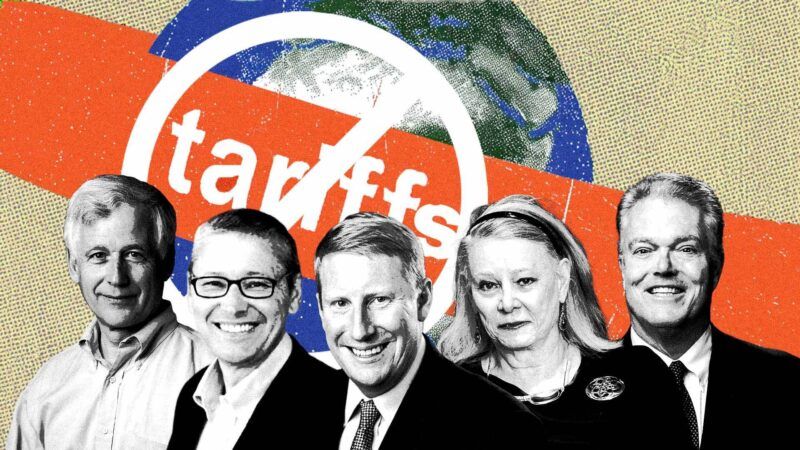Over 1,500 Economists Agree: Trump's Tariffs Are Terrible
Reason interviewed five signatories of the Anti-Tariff Declaration to learn why they oppose tariffs and support free trade.

When the Anti-Tariff Declaration was published on Friday, more than 150 economists signed on to oppose President Donald Trump's trade policy. Less than a week later, the number of signatories increased by an order of magnitude. Reason spoke with five of the economists who signed the declaration about what motivated their decision.
N. Gregory Mankiw, professor of economics at Harvard University, tells Reason the most important takeaway from the declaration is that "economists are really united in opposition to the Trump international economic policy, [which] seems to be founded on a variety of very fundamental misconceptions about economics and economic history."
Michael Munger, professor of economics and political science at Duke University, says he signed because "tariffs are bad domestic policy, and bad foreign policy." Munger explains that the argument for free trade is unilateral: "If another country manipulates its currency, or has trade barriers, that is a harm to THEIR consumers. 'Wealth' is the ability to obtain high quality, low cost products."
Munger hopes the declaration can play a role similar to a letter signed by 1,028 economists urging then-President Herbert Hoover to veto the Smoot-Hawley Tariff Act of 1930. The letter did not succeed in persuading Hoover to veto the bill, but it did help steer the U.S. toward free trade when its predictions were proven right, explains Munger.
Munger also identifies Trump's inconsistent rationales for tariffs as being particularly catastrophic: "Almost ANY consistent policy, even a bad one, can be worked around. But a policy of inconsistency is a disaster in the making."
Mankiw shares Munger's concerns about uncertainty. It's "not healthy for people to think the president on any given day is going to completely upend a set of economic arrangements," he says. One consequence of this uncertainty, he explains, is that business managers delay large fixed investments, such as building a factory, which in turn depresses aggregate demand and employment.
David Henderson, professor of economics at the Naval Postgraduate School and research fellow at the Hoover Institution, warns that Trump's tariffs jeopardize 80 years of progress toward free trade. He also fears that even if Trump rolls back tariffs, "increased uncertainty…will show up in reduced investment" and not all those "countries that retaliate…will cut back their tariffs all the way to their prior relatively low level."
Deirdre McCloskey, professor of economics emerita at the University of Illinois at Chicago and distinguished scholar at the Cato Institute, is pessimistic that the declaration will succeed because people focus on "the seen"—the help given to protected industries—and ignore the "the unseen"—higher prices borne by everyone else.
Henderson also acknowledges that the declaration will not have a huge effect right away but, "even if the effect is small, it will be in the right direction."
Nonetheless, Mankiw believes it's useful for the world to know when the economic profession has a consensus and for economists to speak with one voice when they can. Benjamin Powell, professor of economics and executive director of the Free Market Institute at Texas Tech University, agrees with Mankiw. He tells Reason that the Trump administration's haphazardly imposed tariffs are "completely at odds with the standard mainline understanding of virtually all professional economists."
"Tariffs will harm the well-being of average Americans while failing to achieve the stated and often mutually contradictory objectives of their advocates," says Powell. McCloskey adds that it's the perennial task of economists "to persuade people that trade is mutually beneficial, when you buy an ice cream cone just as much as when you buy a Chinese-made hammer."
Powell, like the four other economists Reason interviewed, hopes that the declaration increases public understanding of the harms of tariffs and "influence[s] the administration to change course."


Show Comments (104)